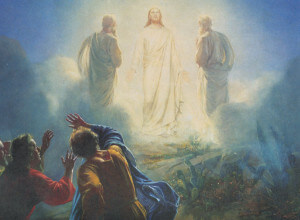Today is the Sunday right before Lent, Lent being a time of turning inwards, giving up things and considering the painful part of Christ’s and of our own ministry, but also already being aware of the victory that would follow and the reward that Christ has won for us.
Now although Lent is still a few days removed from us, the texts for today, as selected in our lectionary, already speak of a kind of Lent and of a kind of revelation of God’s glory in Christ.
The reading from Exodus tells about Moses being on the mountain for 40 days and nights, the same time period as Lent.
And the gospel reading not only compares Jesus to Moses, but also has him enveloped in a dazzling light, giving a glimpse of His glory after the resurrection.
Both events, Moses receiving the stone tablets on mount Sinaï, and Jesus being transfigured, were events in their own right, as well as prophecies, charged with meaning and symbolism.
The story in Exodus starts with Moses being called by God. Now Moses had been called by God before, but that did not mean he could not be called again, to do something specific, to ponder something specific, to become someone different. The same goes for us, really, as we have all been called to follow Christ, most of us have been confirmed, and started our Christian journey when we were baptised. But that was only the beginning. At specific times God may want us to do or to omit certain things, or in any case make time to reflect on his will.
Moses could have said no, and he could even have come up with good reasons not to go on this extensive retreat. After all, he was responsible for many day to day legal and management tasks. But he entrusted Aaron and Hur with these tasks in order to entirely focus on the will of God. Often we make the mistake of thinking that we already know the will of God in a given situation. And we are tempted to think that everything will be all right if people would just listen to us. But Moses does the very opposite. He hands over his authority to others, risking that he will be out of the picture later on. His relation to God is more important than all the things he has taken so much effort for to control and to organise. He realizes that any authority he may have had or still has, is only his because of the God who called him in the first place.
When Moses has gone up the mountain, the glory of God settles on it. But then for 6 days nothing much seems to happen. It is only on the 7th day that God calls to him to enter the cloud. Moses has been waiting behind a kind of veil. Now it is as if he enters the holy of holies, the most sacred part of the future tabernacle. If Moses had been a manager or church leader from the 21st Century, I wonder if he would have had that much patience.
But we also need to look at the symbolism here. Genesis tells us that God created the world in 6 days and rested on the seventh. By using the same numbers in Exodus, the author wants to express that the law is a creation as well. And even more than that, this is the creation of a people with its own laws and statutes.
Now if it takes just as long to create the Torah, as it took to create the world, it tells us something of the vastness and complexity of the Torah. The Jewish people have understood that very well, and they consider the Torah as something to be studied night and day, and which has no end. It is the spiritual counterpart of the laws of nature.
According to Jewish tradition the Torah holds 613 commandments. And these are summarized by the 10 commandments.
By the way, the term commandment is really an incorrect translation. In Hebrew it says, 10 words, or even 10 things. You might say, 10 categories. So they are by no means the whole law that was given to Moses. This is one reason why Moses spent so long, a full 33 days, on the mountain top. Another reason would be that he totally immersed himself in contemplation. What exactly went on on the mountain top, we don’t know. But we can say with certainty that it was not a quick prayer for divine assistance.
Moses realised that his people faced an entirely new challenge after their time in Egypt.
And this required new plans, new structures, new guidelines, new inspiration. Today we are in a similar situation. No need to say that the church faces considerable challenges.
Our congregation faces some challenges as well. Sometimes some profound rethinking is required.
Both Israel and the church were called to be a light to lighten the gentiles. Both Israel and the church sometimes resemble the 5 foolish virgins, who did not take extra oil with them in case the bridegroom would come later than expected. If we are like Moses, or like the 5 wise virgins, we will get all the light and inspiration we can get. Only then will we be able to last during difficult times.
The law of Moses was a custom solution for the people of Israel about to settle in the promised land. But at the same time it was a Law based on timeless principles. And that’s why the story has it that the summary, the essence of the Law, was written by God’s own finger on two tablets of stone. To make a good summary is one of the most difficult things.
People often disagree about the truth and meaning of a joint statement following a meeting.
If you have ever written minutes, you will know this, and how to avoid it by not summarizing at all. But the 10 commandments were more than just a melting pot of different opinions. They had been the core and inspiration of the law all along, giving them structure and cohesion.
Jesus summarizes the law even further when he speaks about loving God above all else and loving your neighbour as yourself. This summary comes even closer to the essence of the kingdom of God. And again these great commandments had been at the heart of the law all along, so in that sense they were not new. In Deuteronomy, it had been written, “Hear, O Israel: The LORD our God is one LORD: And thou shalt love the LORD thy God with all thine heart, and with all thy soul, and with all thy might.” And in Leviticus, the golden rule is formulated as “Thou shalt not avenge, nor bear any grudge against the children of thy people, but thou shalt love thy neighbour as thyself: I am the LORD”.
Now whatever rules we agree on, whatever interpretations of scripture we come up with,
whatever requirements or doctrines or church discipline, they should be in line with and be judged by these great principles, that God, not human beings should be glorified, and that these human beings nevertheless are to be loved as brothers and sisters created in the same image of God.
But Jesus not only summarized the law like no other. The same voice that created the universe and formed the law, spoke of Jesus as his beloved Son, Jesus who fulfilled the law, by loving the Father as well as humanity. He fulfilled the law, not in the sense of doing away with it, but living the essence of the law.
By this time you will probably wonder what all this has to do with us. Many people think that grace, God’s forgiveness through Christ, has replaced the law. But grace and forgiveness, on the contrary, are gifts that can provide peace and silence and space.
And in that silence and space the voice of God can come to us, reminding us of the essence of the law, which is love, an filling us with it. Grace and forgiveness can take away our obsession with self-justification and irrelevant details. The principles of the kingdom can never be replaced by love received, for they include love returned and love passed on. The goal of the Spirit is no less than Christ living in and through us.
So may we, like the disciples, accompany Christ on the mountain. Let us prepare for Lent by letting go of some of our business and control, so that we can listen. May we then hear the voice of God saying “this is my beloved Son”. We will know that we have not been following “cleverly devised myths and fables”. During our Lent meditations, may we encounter the glory and the light of God. May we take some of that light with us in our hearts. And may it shine like a tiny star, remaining visible during the day.






Leave A Comment